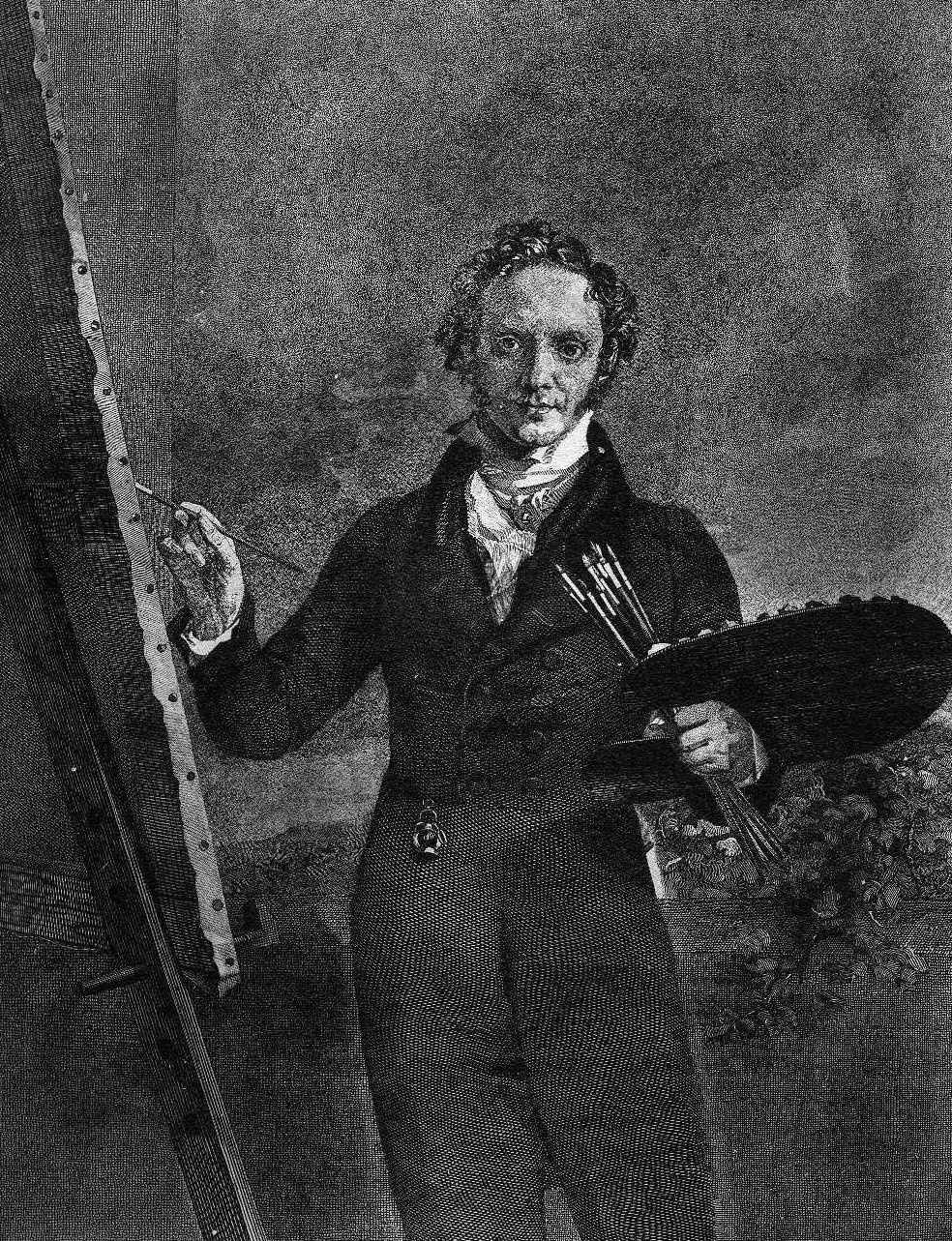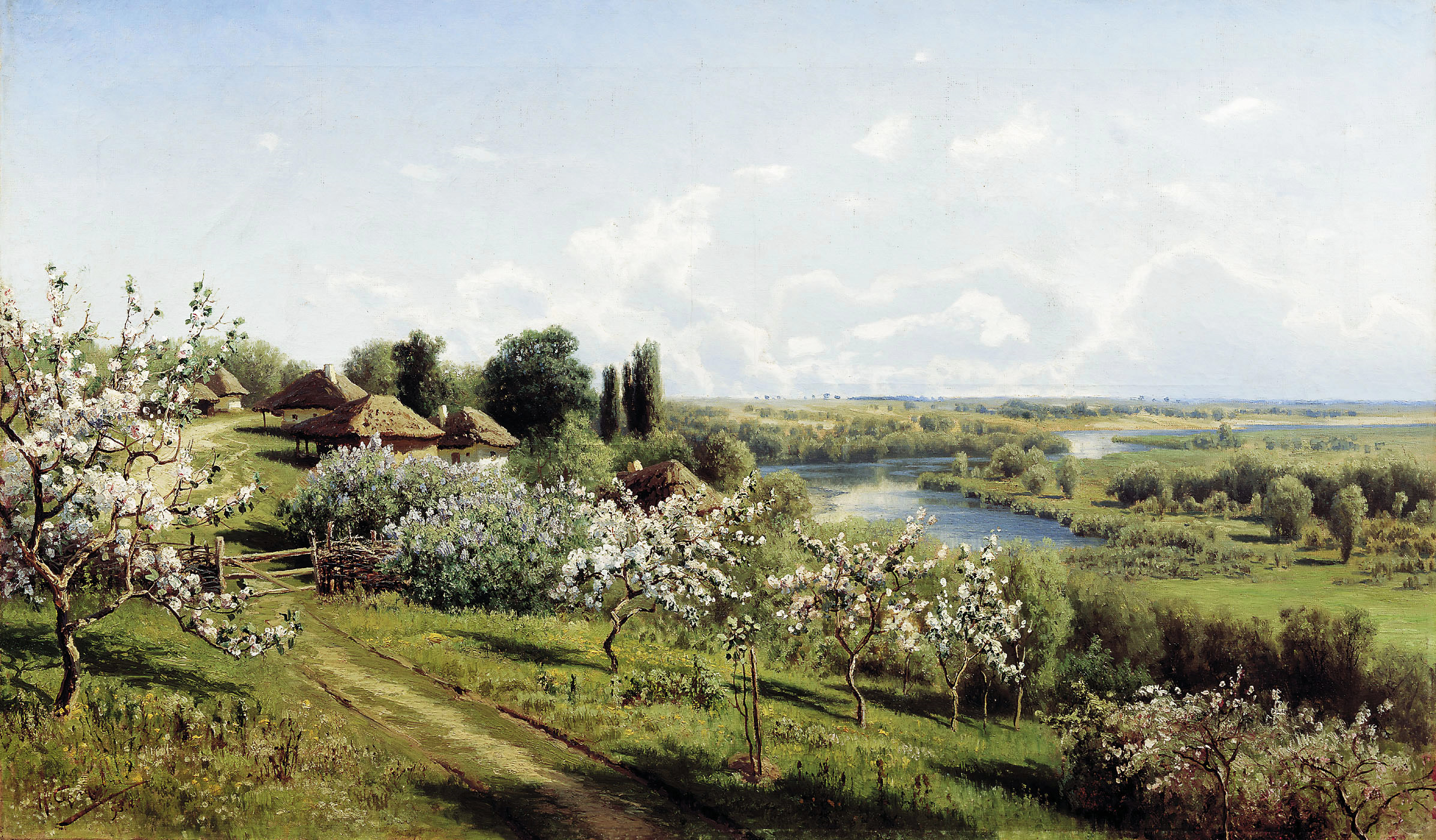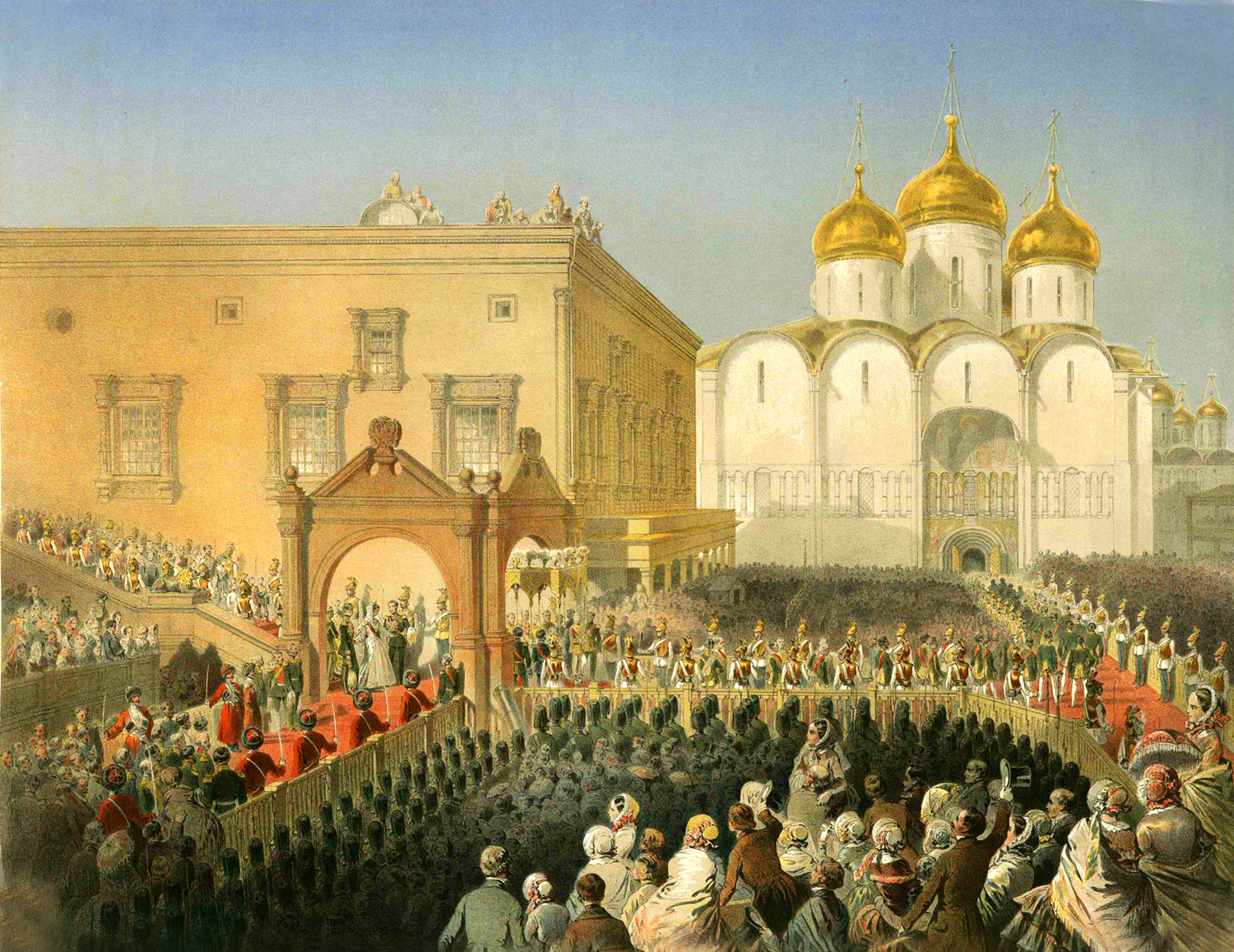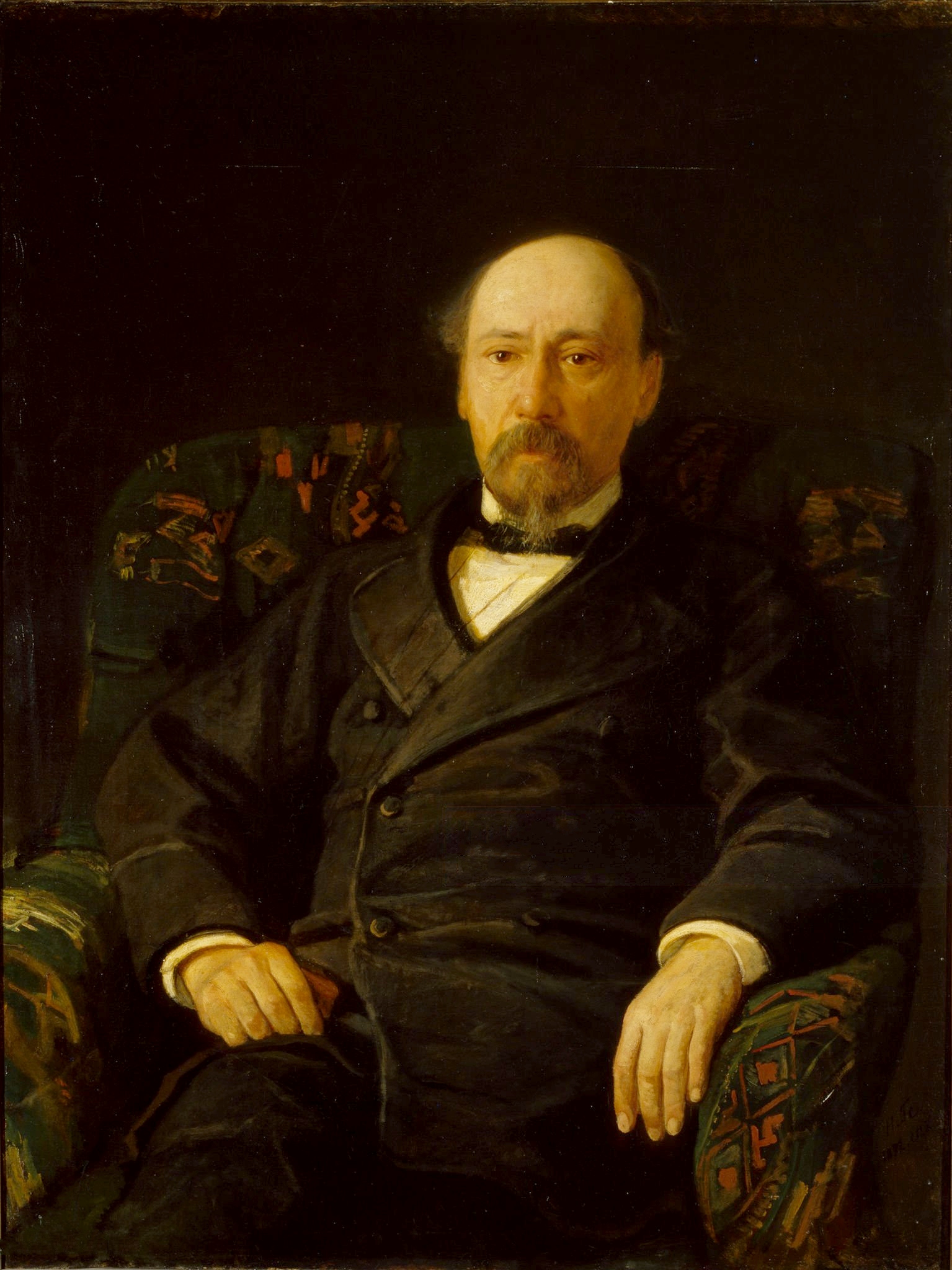|
Sergey Volkonsky
Prince Sergey Grigoryevich Volkonsky (; – ) was a Russian major general and Decembrist from the aristocratic Volkonsky family. Life Sergey Volkonsky was a grandson of Field Marshal Nicholas Repnin, a leading statesman of Catherine the Great's reign. The three brothers Sergey, Nikita Volkonsky and Nikolai Repnin-Volkonsky, distinguished themselves during the Napoleonic Wars. Princess Zenaǐde Wolkonsky was his sister-in-law. Serge Wolkonsky, a theatre director and critic, descended from his son Michail. Volkonsky was promoted Major General after the Battle of Großbeeren and Battle of Dennewitz. He was wounded in the Battle of Eylau. He was the only general still in active service who took part in the Decembrist conspiracy of 1825, an attempt to achieve liberal reform by preventing the accession of Tsar Nicholas I. Following the failure of the revolt, he was found guilty and sentenced to beheading, which was eventually commuted to life in prison. Prince Volkonsky went ... [...More Info...] [...Related Items...] OR: [Wikipedia] [Google] [Baidu] |
George Dawe
George Dawe (6 February 1781 – 15 October 1829) was an English portraitist who painted 329 portraits of Russian generals active during Napoleon's invasion of Russia for the Military Gallery of the Winter Palace. He relocated to Saint Petersburg in 1819, where he won acclaim for his work from the artistic establishment and complimentary verses by Pushkin. He was the son of Philip Dawe, a successful mezzotint engraver who also produced political cartoons relating to the events of the Boston Tea Party. One of his brothers was Henry Edward Dawe, also a portraitist. He died on 15 October 1829 in Kentish Town, United Kingdom. Life and career Early life and studies George Dawe was born on 6 February 1781 to Philip Dawe and Jane in Brewer Street, in the parish of St James's in Westminster. Philip was an artist and engraver in mezzotint who had worked with Hogarth and Joseph Mallord William Turner and who also produced satirical political cartoons about life in America w ... [...More Info...] [...Related Items...] OR: [Wikipedia] [Google] [Baidu] |
Battle Of Dennewitz
The Battle of Dennewitz () took place on 6September 1813 between French forces commanded by Marshal Michel Ney and the Sixth Coalition's Allied Army of the North commanded by Charles XIV John of Sweden, Crown Prince Charles John of Sweden, Friedrich Wilhelm Freiherr von Bülow, Friedrich Wilhelm von Bülow and Bogislav Friedrich Emanuel von Tauentzien, Bogislav von Tauentzien. It occurred in Dennewitz, a village in the Prussian province of Brandenburg, near Jüterbog, southwest of Berlin. The battle marked a turning point in the German Campaign of 1813 as not only did the Allied victory end Napoleon's hopes of capturing Berlin and knocking Prussia out of the war, but the severity of the French defeat, inflicted by a primarily Prussian force, also led to the erosion of fidelity of German allies to the Napoleonic cause. The French losses, and consequent diplomatic reverses, that resulted from Dennewitz contributed greatly to Napoleon's defeat a month later at the Battle of Leipz ... [...More Info...] [...Related Items...] OR: [Wikipedia] [Google] [Baidu] |
Pyotr Sokolov (portraitist)
Pyotr Fyodorovich Sokolov (; 1791 – ) was a Russian Watercolor painting, aquarelle portraitist who painted many of the most distinguished figures of the Alexander Pushkin, Pushkin era. He was the father of the painters Pyotr Sokolov (painter), Pyotr Sokolov, Pavel Sokolov (painter), Pavel Sokolov and Alexander Sokolov (painter), Alexander Sokolov. Early life Sokolov was born in Moscow, and between the years of 1800 to 1809 he attended Imperial Academy of Arts where he studied with Alexei Yegorovich Yegorov, Alexei Yegorov and Vasily ShebuyevBibliographical article in Russia"Соколов Петр Федорович [1791 - 1848]" Retrieved 1 April 2014. who both were very famous and respected artists. In 1809, Sokolov painted "Andromache Mourning Hector" ("Андромаха оплакивает убитого Гектора") for his institution's competition, receiving a minor gold medal as well as the title of "Artist". As part of the Academy's offerings, the stud ... [...More Info...] [...Related Items...] OR: [Wikipedia] [Google] [Baidu] |
Little Russia
Little Russia, also known as Lesser Russia, Malorussia, or Little Rus', is a geographical and historical term used to describe Ukraine. At the beginning of the 14th century, the patriarch of Constantinople accepted the distinction between what it called the eparchies of ''Megalē Rosiia'' () and ''Mikrà Rosiia'' (). The jurisdiction of the latter became the metropolis of Halych in 1303. The specific meaning of the adjectives "Great" and "Little" in this context is unclear. It is possible that terms such as "Little" and "Lesser" at the time simply meant geographically smaller and/or less populous, or having fewer eparchies. Another possibility is that it denoted a relationship similar to that between a homeland and a colony (just as "Magna Graecia" denoted a Greek colony). The name went out of use in the 15th century as distinguishing the "Great" and "Little" was no longer necessary since the Russian Orthodox Church based in Moscow was no longer tied to Kiev. However, with ... [...More Info...] [...Related Items...] OR: [Wikipedia] [Google] [Baidu] |
Alexander Herzen
Alexander Ivanovich Herzen (; ) was a Russian writer and thinker known as the precursor of Russian socialism and one of the main precursors of agrarian populism (being an ideological ancestor of the Narodniki, Socialist-Revolutionaries, Trudoviks and the agrarian American Populist Party). With his writings, many composed while exiled in London, he attempted to influence the situation in Russia, contributing to a political climate that led to the emancipation of the serfs in 1861. He published the important social novel '' Who is to Blame?'' (1845–46). His autobiography, '' My Past and Thoughts'' (written 1852–1870), is often considered one of the best examples of that genre in Russian literature. Life Herzen (or Gertsen) was an illegitimate son of a rich Russian landowner, Ivan Yakovlev, and Henriette Wilhelmina Luisa Haag from Stuttgart. Yakovlev gave his son the surname Herzen because he was a "child of his heart" (German ''Herz''). He was first cousin to Count Ser ... [...More Info...] [...Related Items...] OR: [Wikipedia] [Google] [Baidu] |
Alexander II Of Russia
Alexander II ( rus, Алекса́ндр II Никола́евич, Aleksándr II Nikoláyevich, p=ɐlʲɪˈksandr ftɐˈroj nʲɪkɐˈlajɪvʲɪtɕ; 29 April 181813 March 1881) was Emperor of Russia, Congress Poland, King of Poland and Grand Duke of Finland from 2 March 1855 until Assassination of Alexander II of Russia, his assassination in 1881. Alexander's most significant reform as emperor was the emancipation reform of 1861, emancipation of Serfdom in Russia, Russia's serfs in 1861, for which he is known as Alexander the Liberator ( rus, Алекса́ндр Освободи́тель, r=Aleksándr Osvobodítel, p=ɐlʲɪˈksandr ɐsvəbɐˈdʲitʲɪlʲ). The tsar was responsible for other Liberalism, liberal reforms, including reorganizing the judicial system, setting up elected local judges, abolishing corporal punishment, promoting local self-government through the ''zemstvo'' system, imposing universal military service, ending some privileges of the nobility, and promot ... [...More Info...] [...Related Items...] OR: [Wikipedia] [Google] [Baidu] |
The Captivating Star Of Happiness
''The Star of Captivating Happiness'' () is a 1975 Soviet historical romance. The title is an allusion to a line from the poem '' To Chaadayev'' by Alexander Pushkin. It is a drama with the dedication "to the women of Russia". Plot The story is set in the aftermath of the Decembrist revolt against Tsar Nicholas I in 1825. The revolt is suppressed, the investigation proceeds, and five Decembrists are executed. Other military officers involved are sentenced to exile in Siberia, leaving their wives, known as the Decembrists' women (''Dekabristki''), to decide whether to follow them. In the center of the plot is the fate of Decembrist Ivan Annenkov and his beloved, French seamstress Polina Gueble, whose exile to Siberia unexpectedly provides a chance for them to find happiness together. Polina, without title or wealth, works in a fashionable shop in Moscow, and their marriage would have been impossible before the uprising. After Annenkov’s arrest, trial, and sentence to exi ... [...More Info...] [...Related Items...] OR: [Wikipedia] [Google] [Baidu] |
Oleg Strizhenov
Oleg Aleksandrovich Strizhenov (; 10 August 1929 – 9 February 2025) was a Soviet and Russian stage and film actor. He was awarded People's Artist of the USSR in 1988. Biography Strizhenov was born in Blagoveshchensk in 1929. His family moved to Moscow in 1935, where he grew up. He completed the Boris Shchukin Theatre Institute (Shchuka, The Pike, as it is informally known) in 1953 and from 1953 he was actor in the Russian Theater of Drama in Tallinn (in Estonia); from 1954 to 1955, he acted at the Pushkin Theater in Leningrad, and in 1957 he was at the Screen Actors Theater and Studio in Moscow. From 1966 to 1976 he acted at the Moscow Artists' and Actors' Theater. Career Strizhenov became popular after playing the title character, revolutionary Arthur in ''The Gadfly'', based on the novel by Ethel Lilian Voynich. He also starred in films ''The Mexican,'' as Fernandez/Felipe Rivera, '' The Forty-First'', as Lieutenant Nikolaevich Govorukha-Otrok, '' Pardesi'', as Afanasy Nik ... [...More Info...] [...Related Items...] OR: [Wikipedia] [Google] [Baidu] |
Nikolay Nekrasov
Nikolay Alexeyevich Nekrasov ( rus, Никола́й Алексе́евич Некра́сов, p=nʲɪkɐˈlaj ɐlʲɪkˈsʲejɪvʲɪtɕ nʲɪˈkrasəf, a=Ru-Nikolay_Alexeyevich_Nekrasov.ogg, – ) was a Russian poet, writer, critic and publisher, whose deeply compassionate poems about the Russian peasantry made him a hero of liberal and radical circles in the Russian intelligentsia of the mid-nineteenth century, particularly as represented by Vissarion Belinsky and Nikolay Chernyshevsky. He is credited with introducing into Russian poetry ternary meters and the technique of dramatic monologue (''On the Road'', 1845). As the editor of several literary journals, notably '' Sovremennik'', Nekrasov was also singularly successful and influential. Biography Early years Nikolay Alexeyevich Nekrasov was born in Nemyriv (now in Vinnytsia Oblast, Ukraine), in the Bratslavsky Uyezd of Podolia Governorate. His father Alexey Sergeyevich Nekrasov (1788–1862) was a descendant from ... [...More Info...] [...Related Items...] OR: [Wikipedia] [Google] [Baidu] |
Siberia
Siberia ( ; , ) is an extensive geographical region comprising all of North Asia, from the Ural Mountains in the west to the Pacific Ocean in the east. It has formed a part of the sovereign territory of Russia and its predecessor states since the lengthy conquest of Siberia, which began with the fall of the Khanate of Sibir in 1582 and concluded with the annexation of Chukotka in 1778. Siberia is vast and sparsely populated, covering an area of over , but home to roughly a quarter of Russia's population. Novosibirsk, Krasnoyarsk, and Omsk are the largest cities in the area. Because Siberia is a geographic and historic concept and not a political entity, there is no single precise definition of its territorial borders. Traditionally, Siberia spans the entire expanse of land from the Ural Mountains to the Pacific Ocean, with the Ural River usually forming the southernmost portion of its western boundary, and includes most of the drainage basin of the Arctic Ocean. I ... [...More Info...] [...Related Items...] OR: [Wikipedia] [Google] [Baidu] |
Irkutsk
Irkutsk ( ; rus, Иркутск, p=ɪrˈkutsk; Buryat language, Buryat and , ''Erhüü'', ) is the largest city and administrative center of Irkutsk Oblast, Russia. With a population of 587,891 Irkutsk is the List of cities and towns in Russia by population, 25th-largest city in Russia by population, the fifth-largest in the Siberian Federal District, and one of the largest types of inhabited localities in Russia, cities in Siberia. Located in the south of the eponymous oblast, the city proper lies on the Angara River, a tributary of the Yenisei River, Yenisei, about 850 kilometres (530 mi) to the south-east of Krasnoyarsk and about 520 kilometres (320 mi) north of Ulaanbaatar. The Trans-Siberian Highway (Federal M53 and M55 Highways) and Trans-Siberian Railway connect Irkutsk to other regions in Russia and Mongolia. Many distinguished Russians were sent into exile in Irkutsk for their part in the Decembrist revolt of 1825, and the city became an exile-post for the ... [...More Info...] [...Related Items...] OR: [Wikipedia] [Google] [Baidu] |
Katorga
Katorga (, ; from medieval and modern ; and Ottoman Turkish: , ) was a system of penal labor in the Russian Empire and the Soviet Union (see Katorga labor in the Soviet Union). Prisoners were sent to remote penal colonies in vast uninhabited areas of Siberia and the Russian Far East where voluntary settlers and workers were never available in sufficient numbers. The prisoners had to perform forced labor under harsh conditions. Etymology The term "katorga" (Russian: ) originated from the Ottoman Turkish word "kadırga," which means "galley" (a type of ship). This transition reflects the historical practice where, among others, Ukrainian and Russian slaves, were subjected to severe penal labor on galleys or in similar harsh conditions. In the Crimean Khanate and the Ottoman Empire, the practice of forcing slaves to work on galleys was common, and the suffering endured by these individuals was often depicted in Ukrainian dumas (songs). In the Russian language, "katorga" evolve ... [...More Info...] [...Related Items...] OR: [Wikipedia] [Google] [Baidu] |





